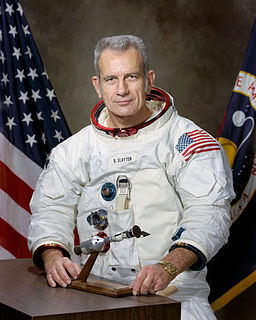A Quote by Deke Slayton
I feel that I'm in on the ground floor of something that human beings will be concentrating on for the next 1,000 years-if we don't destroy ourselves in the meantime. It's possible that 50 years from now we're going to end up out of this solar system, batting around the universe, at least within our galaxy, investigating other stars and other systems.
Related Quotes
When I grew up as a kid, we didn't know there were any other planets outside of our own solar system. It was widely speculated that planet formation was an incredibly rare event and that it's possible that other planets just don't exist in our galaxy, and it's just this special situation where we happen to have planets around our sun.
I tell my students, with a feeling of pride that I hope they will share, that the carbon, nitrogen, and oxygen that make up ninety-nine per cent of our living substance were cooked in the deep interiors of earlier generations of dying stars. Gathered up from the ends of the universe, over billions of years, eventually they came to form, in part, the substance of our sun, its planets, and ourselves. Three billion years ago, life arose upon the earth. It is the only life in the solar system.
Without investments in research and science that will create the next Apple, create the next new innovation that will sell products around the world, we will lose. If we're not training engineers to make sure that they are equipped here in this country, then companies won't come here. Those investments are what's going to help to make sure that we continue to lead this world economy not just next year, but 10 years from now, 50 years from now, a hundred years from now.
While the Copernican principle comes with no guarantees that it will forever guide us to cosmic truths, it's worked quite well so far: not only is Earth not in the center of the solar system, but the solar system is not in the center of the Milky Way galaxy, the Milky Way galaxy is not in the center of the universe, and it may come to pass that our universe is just one of many that comprise a multiverse. And in case you're one of those people who thinks that the edge may be a special place, we are not at the edge of anything either.
We are killing, absolutely killing our energy business in this country. Now I'm all for alternative forms of energy, including wind, including solar, et cetera, but we need much more than wind and solar. You look at our miners, Hillary Clinton wants to put all the miners out of business. There is a thing called clean coal. Coal will last for 1,000 years in this country. Now we have natural gas and so many other things because of technology. We have unbelievable, we have found over the last seven years, we have found tremendous wealth under our feet. So good.
When we gaze at a star in the Milky Way which is 50,000 light-years away from our sun, we are looking back 50,000 years in time." "The idea is much too big for my little head." "The only way we can look out into space, then, is to look back in time. We can never know what the universe is like now. We only know what it was like then. When we look up at a star that is thousands of light-years away, we are really traveling thousands of years back in the history of space.
We live on a hunk of rock and metal that circles a humdrum star that is one of 400 billion other stars that make up the Milky Way Galaxy which is one of billions of other galaxies which make up a universe which may be one of a very large number, perhaps an infinite number, of other universes. That is a perspective on human life and our culture that is well worth pondering.































